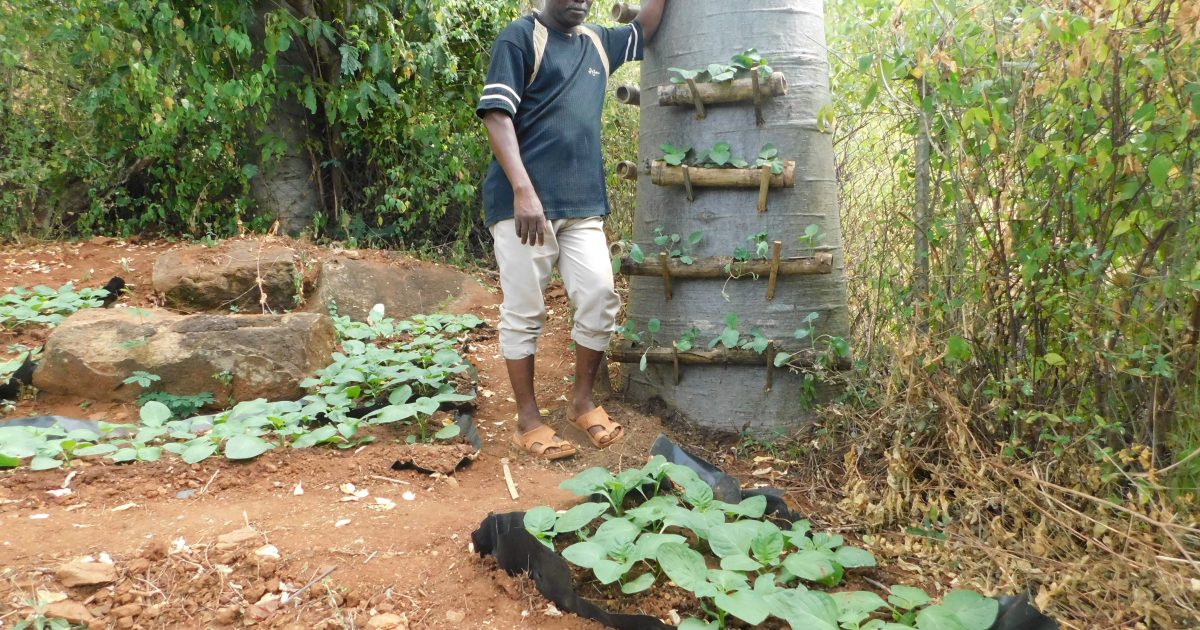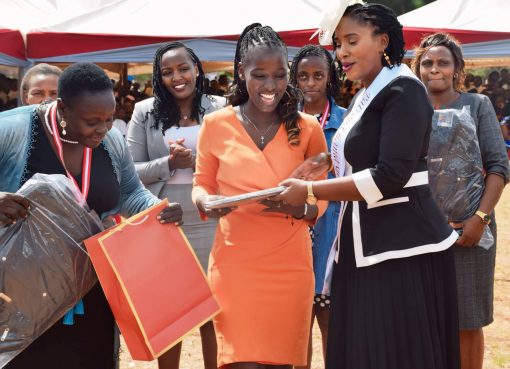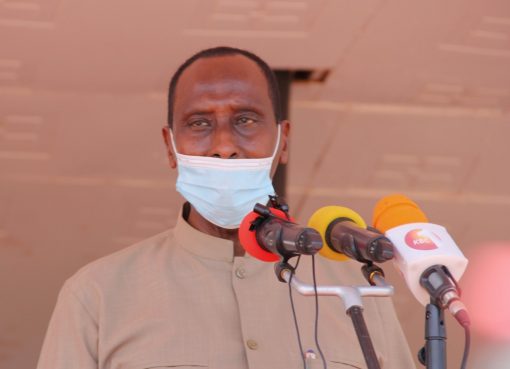In the arid bushes of Mraru village in Mbololo of Voi sub-county, Ms. Eileen Marami picks her way tentatively across her farm. Her destination is a small section at one end of the farm where assorted green vegetables are growing.

They include kales, tomatoes, carrots and spinach. She briefly stops to inspect broad leaves of black nightshade locally known as Managu. The vegetables are planted on soil packed inside a hollowed-out trunk of a baobab tree.
Her fingers deftly pluck young weeds from the moist soil. She looks up dusting her hands. “They are coming along just fine. I am expecting a second harvest in the next two weeks,” she says.
Ms. Marami is amongst hundreds of artisanal farmers in the region whose farming activities are always at the mercy of rainfall seasons. When rains fail, most farms are left bare as crops wilt under the punishing sun. Reports of widespread crop failure are common.
That she is expecting to harvest vegetables at a time the region has not received rainfall for months is a pointer to the potential of the land when innovation is introduced into traditional agricultural practices. Her harvest is as a result of an innovative program dubbed as smart agriculture project that was piloted on her farm.
The smart agriculture technology project, being pioneered by Management of Arid Zones Initiatives and Development Options (MAZIDO) International in Taita-Taveta County, aims to sever artisanal farmers’ overreliance on rainfall to grow essential crops like vegetables for subsistence consumption.
The major objective of the project, according to MAZIDO officials, is to bolster nutritional levels for the low-income households in rural and urban areas who are hardest hit by nutritional deficiencies. This is through encouraging the targeted groups to plant assorted vegetables for domestic use.
The program has already been piloted in Kalolenyi; an urban area and Mraru in Mbololo, a rural set up. The results were so encouraging that the project is currently being rolled out to extend to hundreds of farmers in the Bughuta area in Voi sub-county.
Mr. John Mlamba, the Chief Executive Officer of MAZIDO, says the smart agriculture technology primarily targets to boost the nutrition aspect of food security policies.
He points out that the nutrition bit in the food security debate is rarely well addressed as most initiatives only focus on feeding the hungry and filling their stomachs with whatever food is available. Mlamba says that the smart agriculture program will focus on improving the nutritional capacities of rural and urban poor who withstand the worst of poor dietary requirements.
“The project is intended to bolster the nutritional value in the food eaten by the low-income earners in both rural and urban areas by encouraging them to grow their own vegetables,” he said.
He notes that by growing their food, the residents will halt their dependency on markets for provision of produce they can grow with minimum ease. He adds that this will have a multiplier effect of increasing domestic savings.
Mlamba argues that nutritional deficiencies amongst the poor, especially in towns, is largely driven by a misconception that one must have land to grow food. It is such a perception that also contributes to increased poverty levels amongst low-income earners.
“Due to lack of money, vegetables are treated as luxury yet greens are a very essential part of our diet,” he said.
He also adds that the little money, if available, is used in the market, further impoverishing the person. “This project is teaching that you don’t need to have land to grow crops like kales, carrots and traditional vegetables. All you need is soil,” he says.
The first major rollout for the project will be to 300 rural homesteads covering six rural villages in Bughuta area of Voi sub-county. The area is an arid zone characterized by severe lack of water and long spells of drought. It is also one of the most densely populated zones in Kasighau ward.

For urban set ups, the project has introduced the concept of ‘hanging gardens’ where vegetables and other traditional green vegetables are planted on soil-filled containers and bamboo stalks suspended from walls.
The organization has looped in bamboo-growing farmers to provide bamboo stalks for urban dwellers. The stalks are cut into two halves and filled with soil. They are then hung from the wall from where they can be watered.
“The bamboo stalks filled with soil can be hammered to walls to save on space. You can grow your vegetables,” he said.
In arid areas, farmers will use the sunken beds technology to grow their crops. It entails laying a plastic liner at the base of the bed to enhance the water retention capacity of the soil. The beds are filled with soil mixed with organic manure.
“The beds are to be located in a shady place to reduce the rate of evaporation. It allows a farmer to water the vegetables twice or thrice a week,” says Mr. Mlamba.
To maximize on conservation efforts, the organization is urging farmers to plant fruit trees to provide shade for the vegetables on the sunken beds.
MAZIDO aims to collaborate with Rukinga Ranch to support the program in remote areas to bolster nutritional needs for the rural poor. Selected farmers who will be trained will have their farms act as model farms for educating the rest of the farmers in the villages.
MAZIDO intends to extend the project to other arid areas in the county including Sagalla, Mwatate, Bura and Maktau.
By Wagema Mwangi





